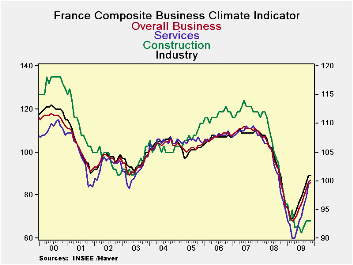 Global| Nov 24 2009
Global| Nov 24 2009Business Confidence In Germany And France
Summary
Overall business confidence in Germany and in France improved slightly in November. Confidence in both countries, however, is still subdued. In Germany, confidence is measured in two ways: (1) as a percent difference between the [...]
 Overall
business confidence in Germany and in France improved slightly in
November. Confidence in both countries, however, is still
subdued.
Overall
business confidence in Germany and in France improved slightly in
November. Confidence in both countries, however, is still
subdued.
In Germany, confidence is measured in two
ways: (1) as a percent difference between the optimists and the
pessimists regarding a particular question and (2) as an index based on
the percent differences with the year 2000=100. Although the
excess of pessimists over optimists regarding the current situation
continued to decline in November, there was still a significant excess,
25.1%. Germans have been much less pessimistic regarding the
outlook six months ahead and in November there was actually a small,
0.2%, excess of optimists over pessimists on the outlook. The
overall climate indicator, which is a combination of present conditions
and future expectations, improved but still showed an excess of
pessimists over optimists, 12.9%. (The percent balances
between the optimists and pessimists for the three indicators are shown
in the first chart.)
The
overall climate indicator, which is a combination of present conditions
and future expectations, improved but still showed an excess of
pessimists over optimists, 12.9%. (The percent balances
between the optimists and pessimists for the three indicators are shown
in the first chart.)
In France, the measures of confidence
are so constructed by INSEE (Institute National de la Statistiques et
des Etudes Economiques) that the long term averages are equal to
100. In November, all the indexes: overall confidence at 87,
confidence in the construction industry at 93, industry at 89 and
services at 86 are still below their long term averages. (The French
business confidence indicators are shown in the second
chart.)  INSEE also publishes turning point indicators that
attempt to detect at the earliest possible moment turning points of the
business cycle. The series tracks the difference between the
probability that the economy is growing versus the probability that it
is contracting and is evaluated between +1 and -1.
A value of +1 indicates that the economy is growing strongly, and one
of -1 indicates that the economy is contracting sharply. A
value close to zero indicates an economy near to its long term average
and is neither growing nor contracting significantly.
(Turning points for the Composite and the Industry Survey Indicators
are shown in the third chart.) The Composite turning point
indicator has been at +1 now for five months, indicating continuing
recovery. The turning point indicator for the Industry Survey, however,
has been falling and in November was negative, suggesting at least some
deceleration of activity in this sector. The November Climate
indicator for Industry was 89, unchanged from October, after a run of
seven increases since March of this year.
INSEE also publishes turning point indicators that
attempt to detect at the earliest possible moment turning points of the
business cycle. The series tracks the difference between the
probability that the economy is growing versus the probability that it
is contracting and is evaluated between +1 and -1.
A value of +1 indicates that the economy is growing strongly, and one
of -1 indicates that the economy is contracting sharply. A
value close to zero indicates an economy near to its long term average
and is neither growing nor contracting significantly.
(Turning points for the Composite and the Industry Survey Indicators
are shown in the third chart.) The Composite turning point
indicator has been at +1 now for five months, indicating continuing
recovery. The turning point indicator for the Industry Survey, however,
has been falling and in November was negative, suggesting at least some
deceleration of activity in this sector. The November Climate
indicator for Industry was 89, unchanged from October, after a run of
seven increases since March of this year.
| GERMANY IFO % Balance | Nov 09 | Oct 09 | Sep 09 | Aug 09 | Jul 08 | Jun 09 | May 09 | Apr 09 | Mar 09 |
|---|---|---|---|---|---|---|---|---|---|
| Current Conditions | -25.1 | -28.6 | -29.1 | -30.8 | -34.3 | -38.1 | -34.9 | -36.0 | -37.7 |
| Expectations | 0.2 | -3.9 | -6.0 | -7.5 | -16.6 | -18.4 | -25.5 | -29.7 | -34.6 |
| Overall Climate | -12.7 | -16.7 | -17.9 | -19.5 | -25.7 | -28.5 | -31.8 | -32.9 | -36.1 |
| FRANCE Business Confidence (LT Avg =100) | |||||||||
| Services | 86 | 85 | 79 | 75 | 70 | 68 | 64 | 60 | 60 |
| Construction | 93 | 93 | 93 | 92 | 91 | 92 | 92 | 92 | 95 |
| Industry | 89 | 89 | 86 | 82 | 79 | 77 | 74 | 71 | 69 |
| Composite | 87 | 86 | 83 | 79 | 76 | 74 | 71 | 69 | 68 |
| FRANCE Turning Points | |||||||||
| Industry | -0.3 | 0.6 | 0.5 | 0.8 | 0.8 | 0.9 | 0.6 | 0.4 | -1.0 |
| Composite | 1.0 | 1.0 | 1.0 | 1.0 | 1.0 | 0.1 | -0.6 | -0.7 | -0.9 |





